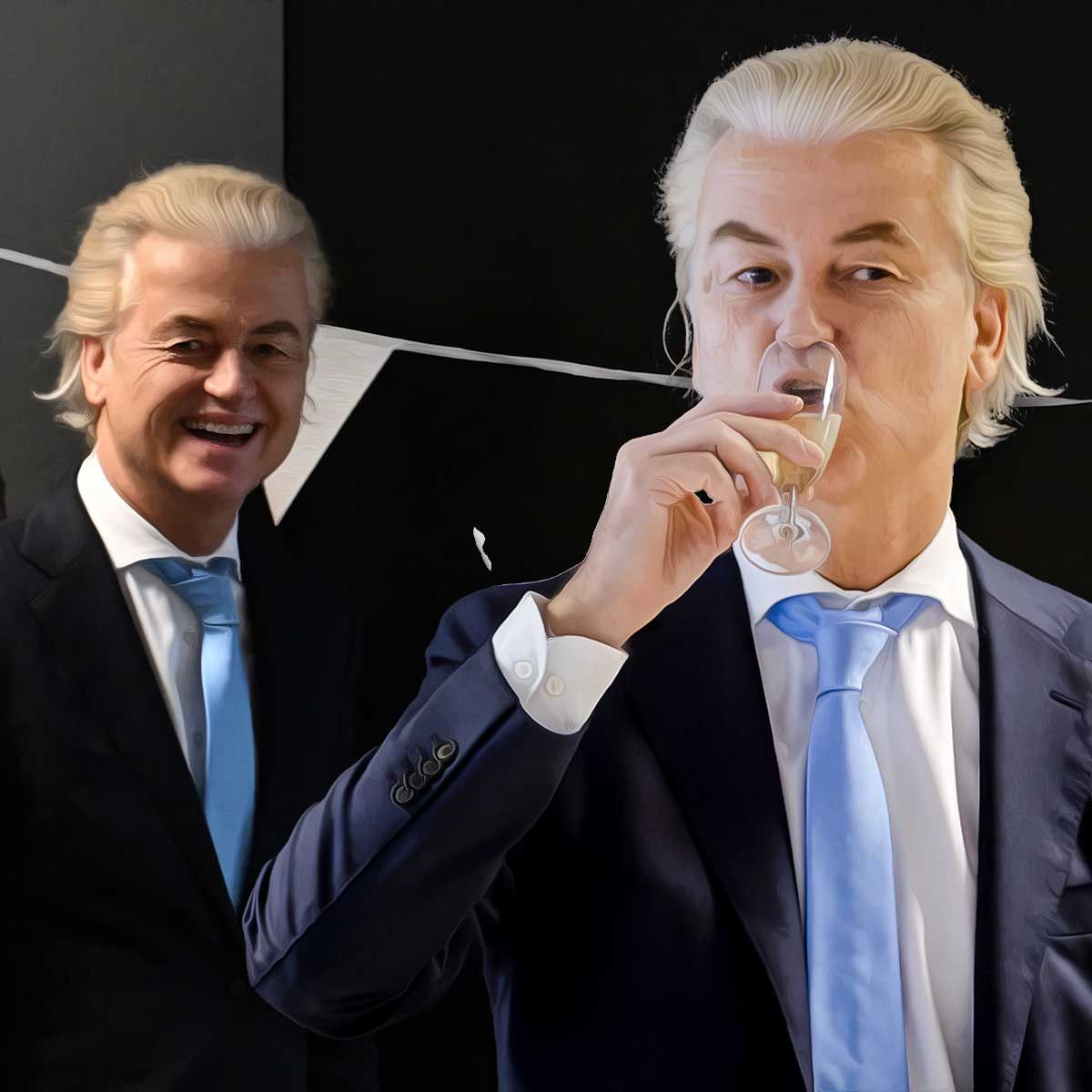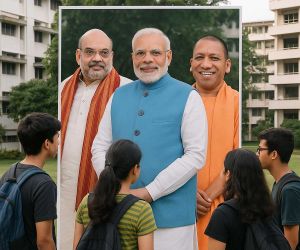MORE COVERAGE
Twitter Coverage
Satyaagrah
Written on
Satyaagrah
Written on
Satyaagrah
Written on
Satyaagrah
Written on
Satyaagrah
Written on
JOIN SATYAAGRAH SOCIAL MEDIA
"Left's Loss Looms: Boom": Geert Wilders' Party for Freedom (PVV) achieves a landmark victory in the Dutch elections, marking a major shift in the Netherlands' political arena. Wilders' win signals a new chapter, potentially reshaping European politics

In an unexpected turn of events, Geert Wilders, a figure who stood by Nupur Sharma amidst her 'blasphemy' allegations, has achieved a significant victory in the Dutch Parliament elections. This development emerged on the 22nd of November as exit polls in the Netherlands indicated that Wilders' Party for Freedom, or Partij voor de Vrijheid (PVV), is poised to become the most influential party in the Dutch parliament.
|
Wilders' triumph in the elections came as a surprise, particularly given the late surge that propelled his anti-European Union party to an overwhelming win against more conventional political rivals. The victory of Wilders, whose party is known for its staunch anti-Islamist views, marks a notable shift in the political landscape of the region. It suggests a growing influence of parties with similar ideologies and could signal broader political changes across Europe.
What makes this victory especially noteworthy is the potential increase in PVV's parliamentary seats. The party is anticipated to secure 35 seats, more than doubling its count from 2021. This substantial increase in representation, however, comes with its own set of challenges. It remains uncertain whether the PVV can form a coalition that holds a working majority, which is crucial for establishing a government.
The impact of Wilders' win is not confined to the Netherlands. It serves as a cautionary note to mainstream parties throughout Europe, especially with the European Parliament elections set for next June. These elections are expected to center around the same pivotal issues that dominated the Dutch election: immigration, the rising cost of living, and climate change. This victory could thus be a bellwether for political trends and voter sentiments across the continent, signaling a potential shift in how European nations address these critical issues.
The victory of Geert Wilders in the Dutch Parliament elections reflects a growing sentiment among voters seeking change. Herman Borcher, a voter from the eastern town of Enschede, succinctly captured this sentiment: "We've had it with the old politicians." This statement underscores a widespread desire for a shift away from traditional political figures and approaches, echoing a broader European trend of disillusionment with the established political order.
|
|
Wilders, known for his admiration of figures like former U.S. President Donald Trump and Hungary's eurosceptic Prime Minister Viktor Orban, has positioned himself as a staunchly anti-Islam and anti-European Union politician. His bold declaration that "the Netherlands will be returned to the Dutch" encapsulates his nationalist and populist agenda, resonating with a segment of the electorate that feels alienated by mainstream politics.
However, despite his strong views and the significant victory, Wilders faces practical limitations in implementing his more radical ideas, such as taking the Netherlands out of the EU or banning the Koran. The reality of political governance in the Netherlands means that Wilders will need to form a coalition with other parties, many of which are likely to reject his more extreme proposals. This necessity for collaboration implies that Wilders will have to make compromises, potentially moderating some of his positions to achieve a workable government.
Despite these potential constraints, Wilders' success has been celebrated by fellow populists across Europe, who view his win as indicative of a broader shift in the political landscape. His victory is seen as evidence that "a new Europe is possible," highlighting a growing appetite among certain voter demographics for populist, nationalist policies that challenge the status quo. This sentiment suggests a changing tide in European politics, where traditional centrist approaches are increasingly being challenged by more radical, nationalist viewpoints.
|
Defying all expectations, Geert Wilders' Party for Freedom (PVV) secured a remarkable victory in the Dutch parliamentary elections, winning 37 out of 150 seats. This outcome placed PVV well ahead of its closest rivals – a joint Labour/Green ticket with 25 seats and the conservative People's Party for Freedom and Democracy (VVD), led by outgoing Prime Minister Mark Rutte, with 24 seats. As a result of this fragmented electoral landscape, extensive coalition negotiations are anticipated, which could span several months.
In the wake of this victory, Wilders expressed his aspirations and willingness to negotiate to form a government. "I would be very happy to become the Dutch prime minister, of course," he stated amid celebrations with his party members. Acknowledging the weight of the electoral mandate, he emphasized, "We are eager to do that, because it gives us a lot of responsibilities, this huge win at the Dutch elections, and we really want to live up to it." This statement reflects Wilders' recognition of the significant responsibilities that come with his party's electoral success and his eagerness to realize the expectations of his electorate.
A pivotal aspect of Wilders' agenda includes his support for a referendum on the Netherlands' membership in the European Union, echoing similar sentiments seen in the Brexit referendum in the United Kingdom. However, Wilders prioritizes implementing "a significant restriction on asylum and immigration," aligning with his party's known stance on these issues. He rationalizes this policy direction by saying, "We don't do that for ourselves, we do that for all Dutch people who voted for us."
The context of this policy stance is underscored by the recent surge in net migration to the Netherlands, which doubled in 2022 to approximately 223,000 people, according to Statistics Netherlands. Notably, a significant proportion of these immigrants, about 64%, came from European backgrounds, with a notable influx from Ukraine. This demographic change may have influenced voter sentiment and contributed to the success of Wilders' party, which has campaigned heavily on issues of immigration and national identity. Wilders' stance reflects a broader trend in European politics where immigration and national sovereignty are increasingly pivotal issues shaping the political discourse.
|
|
The election results in the Netherlands, marked by Geert Wilders' Party for Freedom (PVV) gaining significant seats, have been interpreted by some analysts as less of an endorsement of Wilders' specific policies and more of a broader rebuke of the political establishment. Rene Cuperus, a senior research fellow at the Clingendael Institute, a global affairs think-tank, offered a nuanced interpretation of the vote. He highlighted that despite the PVV's victory, 80% of the Dutch population still favors EU membership, suggesting that an exit from the EU, as well as Wilders' proposal to ban the Koran, are unlikely to materialize.
Cuperus characterized the election outcome as "not an anti-Islam vote. It's not an anti EU vote. No, it's more a middle finger against the establishment in The Hague," pointing to a broader sentiment of dissatisfaction with the status quo among the electorate. This perspective suggests that the vote was a symbolic gesture of frustration, signaling a demand for change in key areas such as the housing market crisis and migration policies. It underscores a growing trend in many democracies where voters are increasingly willing to support alternative parties as a means of expressing discontent with traditional political institutions and leaders.
However, the rise of anti-European forces in the Netherlands has raised concerns in other parts of Europe. German EU Minister Anna Luehrmann expressed her disappointment, stating, "The high level of support for anti-European forces in the Netherlands is bitter." This sentiment is shared by other European leaders who view the election results as a potential harbinger of similar outcomes in upcoming European elections. Luehrmann's call to action, "All pro-Europeans must now work to ensure that this does not happen again in the European elections," reflects a growing sense of urgency among pro-European politicians to counter the rising tide of Euroscepticism and maintain the integrity and unity of the European Union.
|
policy stances, including his opposition to Ukraine's bid to join the European Union and his stance against the Netherlands providing arms to Ukraine. These positions reflect a divergence from the broader European consensus on supporting Ukraine amidst its ongoing conflict with Russia.
This election outcome has also raised concerns among Islamic and Moroccan organizations, as well as other rights groups in the Netherlands. These groups are apprehensive about the implications of Wilders' victory in a country where Muslims constitute approximately 5% of the population. Muhsin Koktas, from the Dutch Muslim organisation CMO, voiced this concern clearly: "We have great concerns about the future of Islam and Muslims in the Netherlands." This statement encapsulates the anxiety felt by the Muslim community about potential changes in policies and societal attitudes that could affect their religious and cultural practices in the Netherlands.
The focus now shifts to the parties that will potentially partner with Wilders in forming a government. During the campaign, many parties had expressed reservations about working with him, but the dynamics have shifted following his electoral win, leading to a more muted response. This change in tone suggests a pragmatic approach to coalition building, where parties might set aside their pre-election reservations to engage in negotiations that reflect the new political reality.
The next significant step in the Dutch political process involves the selection of an 'explorer' on Friday, a political outsider tasked with understanding each party's preferences and possibilities for coalition talks. This role is crucial in the Dutch coalition-building process, as the explorer assesses the viability of various coalitions and facilitates the initial stages of negotiation. The outcome of these talks will be instrumental in shaping the Netherlands' political landscape and will provide insights into how the PVV's victory and Wilders' controversial policies will influence the country's future governance.
|
The election victory of Geert Wilders' Party for Freedom (PVV) brings with it a controversial set of policies that have been central to the party's platform. Notably, the PVV has advocated for extreme measures such as a ban on mosques, the Quran, and the wearing of Islamic headscarves or Hijab in government buildings. With the party now on the trajectory to becoming the largest party in the 150-seat Dutch parliament, these policy proposals are attracting significant attention and concern, particularly among religious and minority groups in the Netherlands.
The PVV's win has been met with congratulations from other Right Wing European leaders, including Viktor Orbán, Marine Le Pen, Matteo Salvini, and Germany’s AfD, signaling a sense of solidarity among Europe's far-right political factions. This alignment reflects a growing pan-European right-wing movement that shares similar views on issues like immigration, national sovereignty, and cultural identity.
However, the formation of a new government in the Netherlands remains uncertain. The heads of the three major Dutch parties have expressed their reluctance to form a coalition with a PVV-led cabinet, indicating potential difficulties in government formation. This hesitancy mirrors broader concerns about PVV's policies and their implications for the Netherlands' domestic and foreign policies.
The process of forming a government in the Netherlands is known for being protracted. Following the 2021 elections, it took 271 days for a 4-party coalition to be established. Experts now believe that it may take even longer to appoint a new Prime Minister. Until a new government is formed, incumbent Mark Rutte will serve as caretaker Prime Minister. The previous coalition's dissolution over migration and other critical issues highlights the complex and contentious nature of these topics in Dutch politics, underscoring the challenges that lie ahead in forming a stable and effective government. This period of uncertainty and negotiation will be a crucial time for the Netherlands, as it navigates its path forward amidst a changing political landscape.
|
Who is Geert Wilders?
Geert Wilders, a prominent figure in Dutch politics, has been a contentious and influential presence for decades. At 60 years old, he has a long history in the political arena, beginning his career with former Prime Minister Mark Rutte's liberal group. However, he later diverged from this path, choosing to serve as an independent lawmaker before establishing the anti-migrant Freedom Party (Partij voor de Vrijheid, PVV in Dutch).
Wilders is known for his vehemently anti-Islamic views, a stance that has led to significant personal risks, including death threats. As a result, he has been under tight police protection since 2004. His controversial positions have not only garnered attention but also legal consequences. In 2020, a Dutch court found him guilty of insult charges related to his comments about Moroccan immigrants, though the court imposed no penalty on him.
He is often compared to other populist figures like Donald Trump and Argentina’s newly elected president, Javier Milei, representing a similar brand of right-wing populism. This comparison underscores his appeal to a segment of the electorate that is disillusioned with mainstream politics and is drawn to more radical, nationalist viewpoints.
Wilders' political journey has been unique. Despite being active in Dutch politics for over 25 years, he has never held a formal office. Born on September 6, 1963, in Venlo, Netherlands, he has been a member of the Dutch House of Representatives since 1998 and has led the PVV since 2006.
|
His early life experiences, particularly his time living in Israel from 1981 to 1983 and traveling across the Middle East, were instrumental in shaping his political views, especially his anti-Islamist stance which has become the cornerstone of his political identity.
Wilders' controversial remarks have often led him into legal trouble. He was convicted of discrimination against Moroccans after raising inflammatory slogans during a 2014 campaign rally, a conviction that was upheld by the Supreme Court of the Netherlands in 2021. He has dismissed these legal challenges as a “witch hunt” against him, indicative of what he perceives as a broken legal system.
Over the years, while Wilders has moderated some of his views, he has consistently maintained a strict anti-immigration and Dutch-first approach. This unyielding stance on immigration and national identity has been a significant factor in his rising popularity, particularly in the context of the recent elections. Wilders' political career and ideologies embody a broader trend in European politics where nationalist and populist movements are gaining traction, challenging the traditional political order and reshaping the political discourse.
|
How did he win?
Geert Wilders' path to victory in the Dutch elections was marked by a series of strategic moves and external factors that contributed to his unexpected success. Initially, few considered Wilders a serious contender. However, the political landscape shifted when Dilan Yesilgoz-Zegerius, Mark Rutte’s successor at the head of the liberal group, opened the door to potential collaboration by stating she would consider serving in a coalition alongside the Freedom Party (PVV). This statement was a significant lifeline for Wilders, as it lent credibility to his party as a viable partner in government formation.
Another factor that played into Wilders' hands was the faltering campaign of early frontrunner Pieter Omtzigt, who lost momentum due to his indecision over his prime ministerial ambitions. This loss of ground by Omtzigt cleared the way for Wilders to gain more visibility and support.
Wilders himself adopted a more pragmatic approach during the campaign. He softened some of his more controversial policies, likely in an effort to appeal to a broader segment of the electorate and to position himself as a viable participant in the next administration. This strategic moderation was coupled with a strong performance in the final election debates, where Wilders appeared more confident and assertive than his rivals, further bolstering his appeal to voters.
An international incident also played a role in elevating Wilders' profile. In October 2022, he publicly supported Nupur Sharma, a former spokesperson of the Bharatiya Janata Party (BJP) in India, who faced backlash for her remarks during a debate. Wilders' defense of Sharma was bold and unequivocal. In a post on a social media platform, he stated, “Nupur Sharma is a hero who spoke nothing but the truth. The whole world should be proud of her. She deserves the Nobel Prize. And India is a Hindu nation, the Indian government is obliged to strongly defend Hindus against Islamic hate and violence.” Additionally, he raised concerns about violence against Hindus and called on the Dutch government to clarify its stance on these issues.
Wilders' support for Sharma resonated with his base and likely helped in solidifying his position as a defender of free speech and critic of Islamic extremism, themes that are central to his political ideology. This stance not only enhanced his visibility but also likely endeared him to voters who share his views on these issues. All these factors combined – strategic moderation, political opportunity, assertive debate performances, and international advocacy – contributed to Wilders' surprising and significant victory in the Dutch parliamentary elections.
Can he really secure a coalition?
As the dust settles from the Dutch parliamentary elections, a key question emerges: can Geert Wilders' Freedom Party successfully form a coalition government? Despite the party's projected win of 35 seats, Wilders faces the challenge of securing a total of 76 seats to achieve an outright majority in parliament.
In response to this challenge, Wilders proposed a center-right coalition that would potentially include outgoing premier Mark Rutte’s former party, the newly-launched center-right group New Social Contract, and the Farmer Citizens’ Movement. If successful, this coalition could command a total of 86 seats, surpassing the threshold for a majority. This strategy indicates Wilders' willingness to collaborate with a range of political entities to form a viable government.
However, the path to forming this coalition is fraught with uncertainties. Before the election, Dilan Yesilgoz-Zegerius of Rutte’s former party had hinted at the possibility of governing alongside Wilders. Yet, on the night of the election, she seemed to backtrack on this position, introducing an element of unpredictability into the coalition-building process. Additionally, while the Farmer Citizens’ Movement expressed interest in being part of coalition talks, their exact terms and conditions for cooperation remain unclear.
The situation is reminiscent of the 1982 elections, when the Dutch Labor Party won the most seats but did not end up leading the government. Instead, a coalition of center-right parties formed the governing body. This historical precedent serves as a reminder that winning the most seats does not necessarily guarantee the premiership in the Dutch multi-party system, where coalition politics play a crucial role in government formation.
In conclusion, while Wilders and the PVV have made significant electoral gains, the task of forming a coalition and securing the top job of Prime Minister is far from straightforward. The dynamics of Dutch politics, coupled with the varied interests and strategies of potential coalition partners, make the outcome uncertain. The coming weeks and months will be critical in determining whether Wilders can translate his electoral success into a leadership role in the Dutch government.
 Support Us
Support Us
Satyagraha was born from the heart of our land, with an undying aim to unveil the true essence of Bharat. It seeks to illuminate the hidden tales of our valiant freedom fighters and the rich chronicles that haven't yet sung their complete melody in the mainstream.
While platforms like NDTV and 'The Wire' effortlessly garner funds under the banner of safeguarding democracy, we at Satyagraha walk a different path. Our strength and resonance come from you. In this journey to weave a stronger Bharat, every little contribution amplifies our voice. Let's come together, contribute as you can, and champion the true spirit of our nation.
 |  |  |
| ICICI Bank of Satyaagrah | Razorpay Bank of Satyaagrah | PayPal Bank of Satyaagrah - For International Payments |
If all above doesn't work, then try the LINK below:
Please share the article on other platforms
DISCLAIMER: The author is solely responsible for the views expressed in this article. The author carries the responsibility for citing and/or licensing of images utilized within the text. The website also frequently uses non-commercial images for representational purposes only in line with the article. We are not responsible for the authenticity of such images. If some images have a copyright issue, we request the person/entity to contact us at This email address is being protected from spambots. You need JavaScript enabled to view it. and we will take the necessary actions to resolve the issue.
Related Articles
- "Milei's Might, Argentina Veers Right": Javier Milei, echoing Trump secures a decisive 56% in Argentina's presidential election, outpacing leftist opponent, his campaign, marked by aggressive anti-left rhetoric signals a major political shift in Argentina
- Who are Trads and Raitas and what is the supposed ‘internal friction’ in the ‘Right Wing’?
- We present a list of trickery, hypocrisy, and biases of the Islamist propagandist Rana Ayyub as she manages to embarrass herself again by infuriating netizens of Saudi Arabia
- MEA spokesperson Arindam Bagchi condemns Somalia-born radical Islamist politician and US Congresswoman Ilhan Omar's visit to PoK, says her ‘narrow-minded politics’ violated India’s territorial integrity, sovereignty
- George Soros’s Open Society Foundation-funded Institute Peace Research Institute Oslo (PRIO) names Open Society functionary Harsh Mander in unofficial shortlist for Nobel prize
- e-commerce giant Amazon hurt Indian sentiments by printing national symbols on various products like shoes, mugs, and T-shirts: FIR registered and Bhopal Police Commissioner sent notice to the company
- Controversial conference co-sponsored by Massey University to advocate abolishment of Hindu Dharma
- Controversial journalist Rana Ayyub's lies surrounding Gujarat Riots to sell her book ‘Gujarat Files’ came crashing down yet again when Madhu Trehan revealed how she had refused to handover fictional ‘tapes’
- Jawaharlal Nehru University A Centre Of Excellence, But It Must Get Rid Of The Anti-National Forces: JNU at At A Dangerous Inflection Point
- Conventional meaning of the 'right' and 'left' wing and how BJP is transcending binaries with its governance model
- From calling wokeness a huge menace to modern civilisation to mocking CNN: Here is what Elon Musk told Babylon Bee
- Propagandists spread hue and cry after PM's new Mercedes Maybach which is a routine replacement, but hushed on Sonia Gandhi using Range Rovers procured for the then PM
- Left-liberals and wokes in India and across globe suffered a major meltdown the moment Elon Musk acquired Twitter Inc. in a $44 billion dollar bid: Twitter locked source code to save from disgruntled employees
- “Bharat se Ghenhu nehi mangayega UAE”: Amid global crisis due to Russia-Ukraine war, UAE suspends re-export of wheat imported from India for food security, Low IQ Islamists rejoice after NDTV said UAE will not import wheat from India
- Anthony Blinken delusional about US primacy over world affairs made schoolmasterish remarks, “US monitoring human rights abuses in India”: Lutyens elites and the editors of India’s English-language media outlets lap it up

























